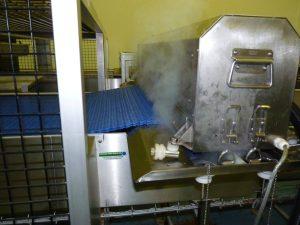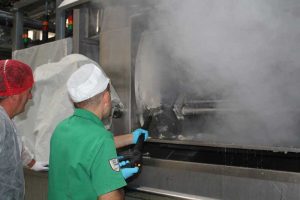Conveyor systems are an integral component of numerous industries, including manufacturing, food processing and logistics. These systems are utilised to transport materials and products from one area to another, rendering them essential for the smooth operation of a business. However, over time, conveyors can become soiled and contaminated with various substances such as dust, dirt, grease and other debris.
This can lead to a range of issues, including reduced efficiency, increased maintenance costs and potential contamination of products. To combat these problems, conveyor cleaning systems are employed to maintain the cleanliness and optimal functioning of conveyors. These systems are designed to remove debris and contaminants from the conveyor belts and other components, ensuring that the entire system operates efficiently and safely.
Summary
- Conveyor cleaning systems are essential for maintaining a safe and efficient working environment in industries such as food processing, pharmaceuticals, and manufacturing.
- Clean conveyors can significantly improve efficiency by reducing downtime, minimising product waste, and preventing contamination.
- There are various types of conveyor cleaning systems available, including brush cleaners, belt scrapers, and air knives, each suited to different conveyor types and cleaning requirements.
- Conveyor cleaning plays a crucial role in preventing contamination of products, ensuring compliance with industry regulations, and maintaining product quality and safety.
- Regular maintenance and cleaning of conveyors not only prolong the lifespan of equipment but also result in cost savings through reduced downtime and lower maintenance costs.
The Impact of Clean Conveyors on Efficiency
The Consequences of Dirty Conveyors
Additionally, dirty conveyors can lead to product contamination, which can have serious consequences for businesses, including costly product recalls and damage to their reputation.
The Importance of Effective Conveyor Cleaning
By implementing effective conveyor cleaning systems, businesses can ensure that their conveyors remain clean and free from contaminants, allowing for smooth and efficient operation. This not only helps to maintain productivity but also reduces the risk of costly downtime and product recalls.
Maintaining Efficiency and Reducing Downtime
Types of Conveyor Cleaning Systems

There are several types of conveyor cleaning systems available, each designed to address specific cleaning needs and challenges. One common type is the mechanical scraper system, which uses blades or brushes to remove debris from the conveyor belt. These systems are effective at removing large particles and stubborn contaminants from the belt surface.
Another type is the air knife system, which uses compressed air to blow debris off the conveyor belt. This type of system is particularly useful for removing lightweight particles such as dust and powders. Additionally, there are wet cleaning systems that use water or cleaning solutions to wash away contaminants from the conveyor belt.
These systems are effective at removing sticky substances and oils from the belt surface. By choosing the right type of conveyor cleaning system for their specific needs, businesses can ensure that their conveyors remain clean and free from contaminants.
The Role of Conveyor Cleaning in Preventing Contamination
Contamination is a serious concern for industries that rely on conveyor systems to transport products. Contaminants such as dirt, dust, grease, and other substances can accumulate on conveyor belts and other components, posing a risk to the products being transported. This can lead to product spoilage, quality issues, and even health hazards if the products are consumed by end-users.
By implementing effective conveyor cleaning systems, businesses can prevent contamination and ensure that their products remain safe and high-quality. These systems help to remove contaminants from the conveyor belts, reducing the risk of cross-contamination between different products and ensuring that the products remain clean and safe for consumption or use.
The Importance of Regular Maintenance and Cleaning
Regular maintenance and cleaning of conveyor systems are essential for ensuring their longevity and optimal performance. Over time, conveyors can become dirty and worn due to regular use, leading to increased friction, wear and tear, and potential breakdowns. By implementing regular cleaning schedules and maintenance routines, businesses can prevent these issues and extend the lifespan of their conveyor systems.
Regular cleaning helps to remove debris and contaminants that can cause damage to the equipment, while maintenance tasks such as lubrication and inspection help to identify and address potential issues before they escalate. By investing in regular maintenance and cleaning, businesses can save on costly repairs and replacements while ensuring that their conveyor systems continue to operate efficiently.
Cost Savings and Longevity of Equipment

Reduced Downtime and Increased Productivity
Additionally, clean conveyors experience less wear and tear, leading to extended equipment lifespan and reduced replacement costs. Furthermore, by preventing product contamination through effective conveyor cleaning, businesses can avoid costly recalls and damage to their reputation.
Extended Equipment Lifespan
Clean conveyors require less maintenance and are less likely to suffer from mechanical failures, resulting in reduced maintenance costs and extended equipment lifespan.
Improved Profitability
Overall, investing in quality conveyor cleaning systems can result in substantial cost savings and improved profitability for businesses.
Best Practices for Implementing Conveyor Cleaning Systems
When implementing conveyor cleaning systems, businesses should consider several best practices to ensure their effectiveness and efficiency. Firstly, it is important to choose the right type of cleaning system for the specific needs of the conveyor system and the industry in which it operates. This may involve consulting with experts or conducting tests to determine the most suitable cleaning method.
Additionally, businesses should establish regular cleaning schedules and maintenance routines to keep their conveyors clean and well-maintained. This may involve training staff on proper cleaning procedures or outsourcing cleaning tasks to professional service providers. Furthermore, businesses should invest in quality cleaning equipment and products to ensure thorough and effective cleaning of their conveyors.
By following these best practices, businesses can ensure that their conveyor cleaning systems deliver optimal results and contribute to the overall efficiency and safety of their operations. In conclusion, conveyor cleaning systems play a crucial role in maintaining the efficiency, safety, and cleanliness of conveyor systems in various industries. By keeping conveyors clean and free from contaminants, businesses can prevent equipment breakdowns, reduce maintenance costs, prevent product contamination, and ensure high levels of productivity.
There are various types of conveyor cleaning systems available, each designed to address specific cleaning needs and challenges. Implementing regular maintenance and cleaning schedules is essential for ensuring the longevity and optimal performance of conveyor systems. By investing in quality conveyor cleaning systems and following best practices for their implementation, businesses can achieve significant cost savings and long-term benefits for their operations.
FAQs
What are conveyor cleaning systems?
Conveyor cleaning systems are equipment and devices designed to remove debris, spillage, and other contaminants from conveyor belts and other material handling equipment.
Why are conveyor cleaning systems important?
Conveyor cleaning systems are important for maintaining efficiency in material handling operations. They help prevent product contamination, reduce equipment downtime, and improve overall workplace safety.
How do conveyor cleaning systems maintain efficiency?
Conveyor cleaning systems maintain efficiency by ensuring that conveyor belts and other material handling equipment are free from debris and contaminants, which can cause equipment malfunctions and product quality issues.
What are the different types of conveyor cleaning systems?
There are various types of conveyor cleaning systems, including belt scrapers, brush cleaners, air knives, and vacuum systems. Each type is designed to address specific cleaning needs based on the type of material being conveyed and the operating environment.
What industries benefit from conveyor cleaning systems?
Industries such as food processing, pharmaceuticals, manufacturing, and logistics benefit from conveyor cleaning systems to maintain cleanliness, prevent product contamination, and comply with industry regulations.
How do conveyor cleaning systems contribute to workplace safety?
Conveyor cleaning systems contribute to workplace safety by reducing the risk of slip and fall accidents caused by spillage on conveyor belts, as well as by preventing equipment malfunctions that could pose safety hazards to workers.










